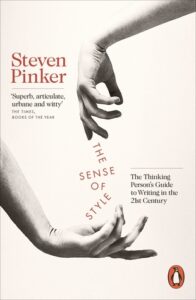 The Sense of Style, Steven Pinker
The Sense of Style, Steven Pinker
Perhaps a book on how to write by a scientist who studies neurology and linguistics and how they interact seems odd, but it’s right up Pinker’s street. He loves to think about language and the way it evolved, and what is natural for our brains when it comes to language. While he does go into the rules of grammar and the parts of speech and all of that, he tempers it with an understanding of why we make the kinds of mistakes we do, and when it might be time to let go and surrender to the fact that we just don’t think the way grammar prescriptivists would like.
His style is, fortunately, readable and engaging, though I did begin to tune out when it got very technical, or when there were a lot of tables presenting all kinds of information. I’ve never learnt to diagram a sentence, being part of that denigrated lot who didn’t get taught grammar in school. Instead, I rely on… well, a sense of style. A gut feeling that something is right or wrong. It usually doesn’t steer me wrong; where it might trip me up is in more formal writing, and cases that don’t often come up — like remembering how exactly to apply who vs. whom.
I enjoyed the parts of this which touched specifically on academic writing, and the kind of nonsense academics can sometimes produce in their attempts to elevate their subject of study and get funding. It’s why a lot of literary theory is utterly impenetrable to me, for example. On the other hand, I can see that if I applied some of Pinker’s ideas to the style of my undergrad science essays, I’d get very low marks. Sometimes you just have to bow to the academicese.

I was an English major so I had to diagram sentences but I was horrid at it. I just don’t see the point of sentence diagrams. It doesn’t make things easier for me.
And yea, I try to read academic papers sometimes but they are so hard to get through.
I have an English Lit postgraduate degree, but such a thing never came up for me!
They really can be. Science is a bit better than literature, I’ve found, but sometimes they seem to delight in being abstruse.